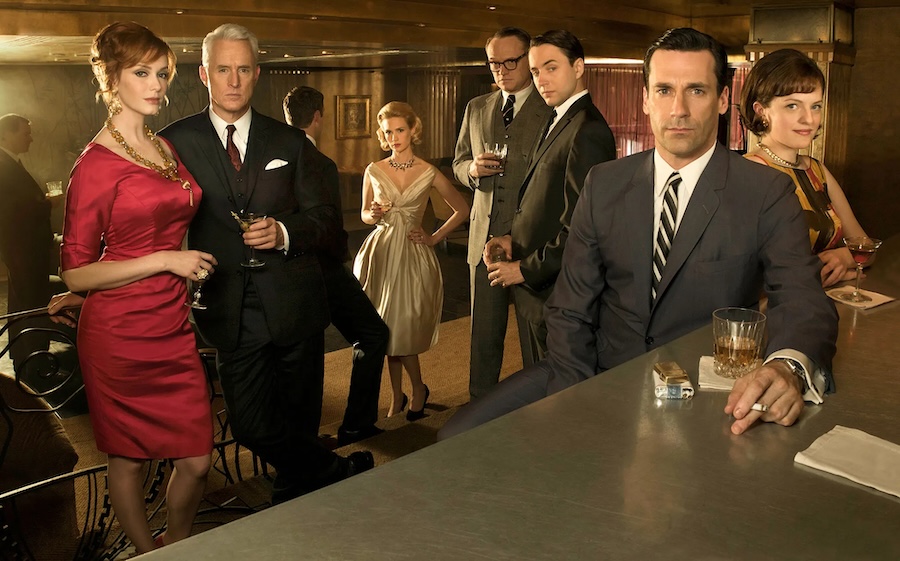ABOVE AVERAGE

Walking down Madison Avenue in New York City is a dream where you can fantasize about the glamorous lives of those who work inside the tall buildings. But much of it is of course exactly that, a fantasy. Mad Men is a TV drama about them, showing the kind of luxury these people have worked hard to afford. But unlike many predecessors, especially shows of the 1980s, this one took us closer to the reality behind the façade.
Despite all the talk and numerous magazine articles about the fashion, trends and styles of the era Mad Men depicts, that’s what the show comes down to – our real lives, which are exciting and uneventful at the same time.
Fighting sexism at every turn
The story began in 1960 with brilliant Sterling Cooper ad executive Don Draper (Jon Hamm) meeting his new secretary, Peggy Olson (Elisabeth Moss). While the firm works hard to ensure Vice President Richard Nixon’s electoral success, and satisfying major client Lucky Strike, we are introduced to the complicated personal lives of the firm’s main characters. Peggy realizes that having ambitions means that she has to fight sexism at every turn. Roger Sterling (John Slattery), one of the firm’s co-founders, is having a fling with office manager Joan Holloway (Christina Hendricks), and Don is sleeping with a beatnik artist while his marriage with Betty (January Jones) turns increasingly rocky.
As Betty seeks help from a psychiatrist, Don is desperately trying to hide the fact that he once stole another person’s identity…
Living up to our memory
As Mad Men wound down to a close, the most interesting discussions about how to summarize the series popped up. Over the years, a lot of them focused only on the surface. Creator Matthew Weiner and his team did an excellent job with that. The show took place over exactly one decade, depicting the 1960s from every angle. Art direction, make up, choice of music and costume design all collaborated to live up to our memory or perception of what the decade was like, without turning too predictable. None of us could escape the fascination of watching behavior and cultural trends that we now think of as obsolete, or even insane, such as the incessant smoking and drinking. Underneath the surface was however a revolution at work, as the show depicted what was considered culturally subversive themes of the day – homosexuality, women’s rights and when it came down to it, individual liberty.
You could see Mad Men as a judgment on a generation, namely the one Matthew Weiner’s parents belonged to.
Weiner created very interesting roles for women and cast them brilliantly, offering realistic and varied challenges for Betty, Joan and Peggy. Audiences marveled at what a difference a few decades make, but were also constantly given a chance to ponder what hasn’t changed. You could see Mad Men as a judgment on a generation, namely the one Weiner’s parents belonged to; one could imagine Weiner himself as being close to Sally (Kiernan Shipka), the Draper daughter who at an early age saw right through the phony lives of her mom and dad. Mad Men was indeed the creator’s way of writing a love letter to the era that also condemned its false moral values straight to hell.
Cast to perfection, most of the actors had major breakthroughs. The final episode ended Don Draper’s journey brilliantly, tying the cultural revolution of the 1960s to his own career as a brilliantly perceptive and cynical ad man in the shape of the most classic Coca-Cola ad ever made. Some criticized it as being too corny. I’d say the ending is hauntingly accurate as far as Don’s character goes.
Mad Men 2007-2015:U.S. 92 episodes. Color. Created by Matthew Weiner. Cast: Jon Hamm (Don Draper), Elisabeth Moss (Peggy Olson), January Jones (Betty Draper), Vincent Kartheiser, Christina Hendricks, John Slattery, Aaron Staton, Rich Sommer, Alison Brie, Kiernan Shipka, Robert Morse (07-14), Jessica Paré (10-15), Christopher Stanley (09-15), Jared Harris (09-12), Jay R. Ferguson (10-15), James Wolk (13-14), Kevin Rahm (13-15), Harry Hamlin (13-14), Ben Feldman (12-14), Bryan Batt (07-09), Michael Gladis (07-09).
Emmys: Outstanding Drama Series 07-08, 08-09, 09-10, 10-11; Writing 07-08, 08-09, 09-10; Actor (Hamm) 14-15. Golden Globes: Best Drama Series 08, 09, 10; Actor (Hamm) 08, 16.
Last word: “There are very long hours on a sitcom [where I was working], but I just started [writing Mad Men] as a hobby. Like, ‘This is my mistress.’ I’m going to work on this advertising project and taking notes and doing research before there was a viable Internet in many ways. I hired someone to go on Prodigy for me, because I couldn’t figure it out. I hired someone to go to the library and research all the tobacco stuff. I bought VHS tapes of movies that were very obscure — and quite expensive, if you ask my wife. But it was always me keeping my eye on things. And it was interesting because the first of the DVRs had come out and I had one called the Replay machine. And you could actually set it on the meta data for the year. And so I would have 1958, 1959 and 60 on there as – and it would just record movies off TCM or whatever – anything, any rerun anywhere that was playing. And I started getting inundated with this vibe that was proving a theory that I had that life was not that different. I did that for a couple of years. I didn’t pull the trigger until a couple of years after I was working there.” (Weiner, HitFix)
